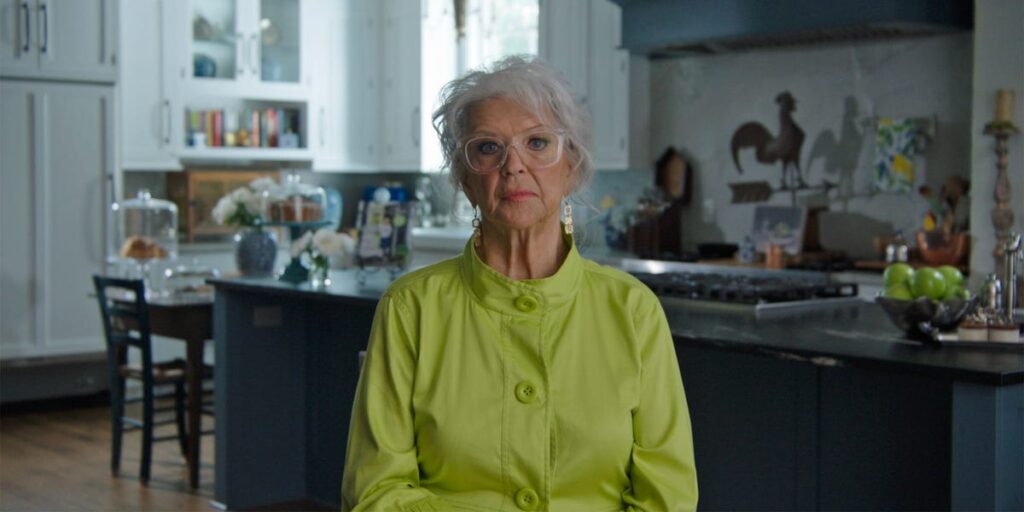In April 2024, filmmaker Billy Corben was driving around Savannah, Georgia, with erstwhile Food Network queen Paula Deen and her two sons, Bobby and Jamie, when he asked Bobby an important question.
“At the end of our drive, I said, ‘Bobby, what do you think? Do you think you guys should be making a documentary?'” Corben recalled to Business Insider. “And he goes, ‘Aw, finally somebody asks me! No. I do not think we should.”
Deen’s rise and fall are undeniably compelling. Deen captivated the nation with her approachable persona and comforting, butter-heavy take on Southern cooking on the Food Network in the 2000s and 2010s. But when it was revealed in 2013 that she had admitted in a deposition to using a racial slur, she quickly fell out of favor with the public: she was fired by the Food Network and lost numerous brand deals.
Now, 12 years later, Corben thought it might be time for another look at Deen’s legacy, and was hoping for the Deens’ blessings. Though Bobby’s denial started off as a hurdle to his plans, the conversation quickly turned into a therapy session as Bobby vented, Paula sobbed, and Jamie tried to be peacemaker. The scene convinced Corben that he simply had to push forward.
“For the next 20 minutes, it was the greatest documentary I’ve never made,” Corden told BI while in the midst of putting the final touches on the documentary before it has its world premiere at the Toronto International Film Festival on Saturday. “That’s when I decided I wanted to make it.”
John M. Heller/Getty Images
“Canceled: The Paul Deen Story” is an insightful and heartfelt examination of the celebrity chef’s rise and fall. It also brings much-needed context to the controversy.
Corben, best known for his “Cocaine Cowboys” documentary franchise and the popular 2022 Hulu doc “God Forbid,” does this by chronicling Deen’s meteoric rise from a mother of two serving food out of a Best Western to Food Network superstar at the age of 47.
All of that came crashing down in 2013 when one of Deen’s employees filed a racial and sexual discrimination lawsuit. Though the suit was later dismissed, it led to a deposition in which Deen was asked if she’d ever used the N-word, to which she replied, “Yes, of course.” Her response set off a media firestorm and a chain reaction of business losses.
In the documentary, Deen gives context to that answer, saying the last time she used that racial slur was when she was held at gunpoint by a Black man while she was a bank teller in the 1980s. But all that ran in news coverage and the social media outrage that followed was her “Yes” response.
“The headline spread, it didn’t spread the story,” Corben said. “That’s the difference between the doc and what happened in 2013. If you watch the doc and you say she got what she deserved, so be it. If you watch the doc and say she didn’t, so be it. But at least you’ll have an informed opinion.”
Gareth Cattermole/Getty Images
Though documentaries about disgraced public figures often are intended to launch their subjects’ comebacks, Corben said that was never his intention. As his longtime producing partner Alfred Spellman put it, the movie is as much an examination of life during the aughts as it is a look at Deen.
“One of the best compliments we’ve ever gotten is being called cultural anthropologists,” Spellman said. “Lately, with our movies, we’ve liked to go back to the last 10-15 years in American culture and examine how society operates.”
So has Deen seen the movie, and if so, does she like it?
“I have not heard from her,” Corben said, though the movie’s publicist confirmed to Business Insider that Deen and her sons will be attending TIFF.
Since Deen’s empire collapsed, she’s sold her custom-built riverfront estate. Just recently, the restaurant that made her famous, The Lady & Sons, closed its doors. But she’s still doing cooking segments — she showed up on “Fox & Friends” last month — and has a chain of restaurants in the South called Paula Deen’s Family Kitchen.
The way Corben sees it, Deen doesn’t want to return to her early aughts fame; all she wants is for people to hear her side of the story.
“She says it in the doc: ‘I don’t want it to say on my tombstone, here lies the body of a racist,'” Corben said. “She wanted to feel like she spoke her piece.”



